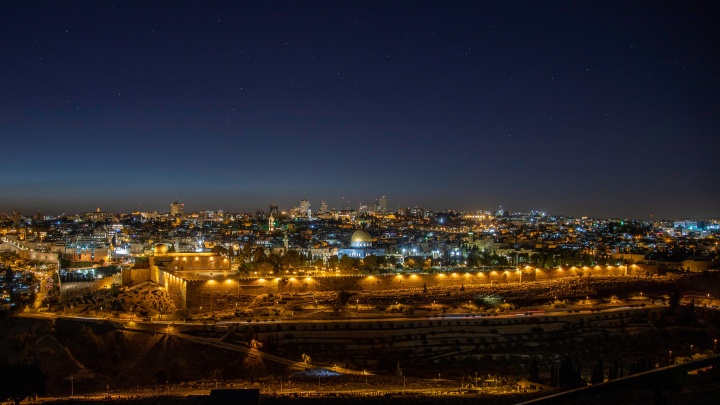By the Rivers of Babylon
Remembering Jerusalem When You've Never Been There

“By the rivers of Babylon, there we sat down, yea, we wept when we remembered Zion. We hung our harps upon the willows in the midst of it. For there those who carried us away captive asked of us a song, and those who plundered us requested mirth, saying, ‘Sing us one of the songs of Zion!’” (Psalm 137:1-3).
There are a number of popular and enjoyable renditions of this psalm. The words have been on my mind lately. It's hard to imagine being taken away from home by force. But the next section of the psalm has me interested from another perspective.
“How shall we sing the LORD’s song in a foreign land? If I forget you, O Jerusalem, let my right hand forget its skill! If I do not remember you, let my tongue cling to the roof of my mouth—if I do not exalt Jerusalem above my chief joy” (Psalm 137:4-6).
The Psalmist is remembering Jerusalem. Perhaps like many Christians, I have never visited Jerusalem. How could I relate to this if I’ve never been to Jerusalem?
God connects several topics to Jerusalem throughout His Word. Examining three of these subjects gives us a clearer picture of Jerusalem and a better appreciation of this psalm.
1. A center of worship
During the giving of the Law, God pointed Israel toward a place He would choose, a place for them to gather together (Deuteronomy 12:5). But the Lord didn't just want His People to go there to hang out; He wanted them to journey there and worship Him! “There you shall bring all that I command you: your burnt offerings, your sacrifices, your tithes, the heave offerings of your hand, and all your choice offerings which you vow to the Lord” (Deuteronomy 12:11-14).
Hundreds of years later, God identified this place as Jerusalem through the dynasty of King David: “I have chosen Jerusalem, that My name may be there” (2 Chronicles 6:6). In doing so, God directly connected Jerusalem to sincere and purpose-filled worship of Him.
When Israel and Judah experienced division under kings Rehoboam and Jeroboam, the power of this connection was recognized. Jeroboam created new worship practices so the people would not be drawn back to Rehoboam, who controlled Jerusalem in the south (1 Kings 12:28-33). For example, Jeroboam fashioned two golden calves to be set up in the north for worship, something God never commanded and a past source of error for Israelites (Exodus 32:2-4). He also instituted a festival exactly one month after the biblical Feast of Tabernacles when the Israelites were commanded to travel to Jerusalem to worship (Leviticus 23:33-36).
As we can see by this example, we must seek God and follow His instructions in order to please Him in worship. The Lord Himself reinforced this principle during His ministry on Earth by teaching “God is Spirit, and those who worship Him must worship in spirit and truth” (John 4:24). Our worship should only be directed toward God and should be something we take care to do properly (Matthew 4:10).
2. A dwelling for His Spirit
King David’s house was also responsible for the design and fabrication of God’s temple in Jerusalem, a work of impressive logistics, craftsmanship and wealth. When it came time for the Ark of the Covenant to be brought into this first temple, the priesthood ministered with singing in praise and thanksgiving to the Lord. There came a moment when the priests couldn’t continue. This house—this temple—was filled with the glory of God; He had chosen it and made it holy (2 Chronicles 5:11-14, 2 Chronicles 7:16).
Just as before, this principle is reflected later in the scriptures. The apostle Paul wrote to one church congregation that they were “the temple of God and that the Spirit of God” dwelled in them (1 Corinthians 3:16-17). Those in the Church of God—His children, those bearing His Spirit—are the collective and holy Temple of God (Romans 8:14; 1 Peter 2:9).
God’s people have always been obligated to treat holy things as holy (Exodus 20:8-11; Exodus 30:31-32). As one part of this holy temple, Paul taught the Corinthians to begin by treating themselves as holy, in particular by avoiding sexual misconduct (1 Corinthians 6:18-19). Christians ought to treat themselves with honor and respect by changing their behavior to imitate Jesus Christ.
But the Christian alone is just a single part of that one, greater temple, and it must be one temple because one Spirit dwells in it (Ephesians 4:3-6). A house is not a house if it is broken into many pieces. Such a house is in a state of disrepair and cannot be lived in. It is to the shame of the household of God that division and sin take root (1 Corinthians 11:18-22; 1 Corinthians 1:10-13).
Christians everywhere should seek to mend broken relationships, care for one another in service, and yield to the Spirit to produce a more unified Church of God (Romans 12:18; Romans 14:19). “Therefore, as we have opportunity, let us do good to all, especially to those who are of the household of faith” (Galatians 6:10).
3. A hopeful future
By faith Abraham “waited for the city which has foundations, whose builder and maker is God” (Hebrews 11:10). God has a future for His People and, at the center of it all, He has prepared Jerusalem (Hebrews 11:16).
During the Kingdom of God, Jerusalem will become a destination for people of every nation. From this city, the Word of God will go out to everyone. All alive will have an opportunity to know God and to sincerely walk in His paths. From Jerusalem, peace will begin and expand across the face of the Earth (Micah 4:1-3).
At that time, a physical temple will be rebuilt in Jerusalem and, just as the former temple, it will be filled with the glory of God (Ezekiel 43:2-5). Offerings will go up to God from this new temple; it will be the worldwide centerpiece of godly worship.
Still further into the future, an entirely new but familiar city is coming. A city not made out of steel and bricks but out of spirit, this city is the New Jerusalem, and it will come as part of a new heaven and new earth. Then, “God will wipe away every tear” and death, sorrow and pain will all pass away (Revelation 21:1-4).
This great future is a powerful hope, a motivation for the people of God! We push through the trials and the hard times to feel and see and touch this future: “Let us hold fast the confession of our hope without wavering, for He who promised is faithful” (Hebrews 10:23).
Jerusalem is a destination many people hope to visit one day, but should be a place of great importance for Christians—whether they’ve been there or not. The city is central to godly worship throughout the scriptures and Christians today must continue to sincerely worship Him. God sanctified the temple in Jerusalem with His Spirit for many years, just as He sets followers apart with His Spirit now. Those with the Spirit should be affectionate toward and united with one another. Jerusalem is a beam of the gospel message’s light in this dark world, with a prophesied future of harmony and joy for all humanity. Let’s learn, exalt, and never forget, the lessons of Jerusalem.
